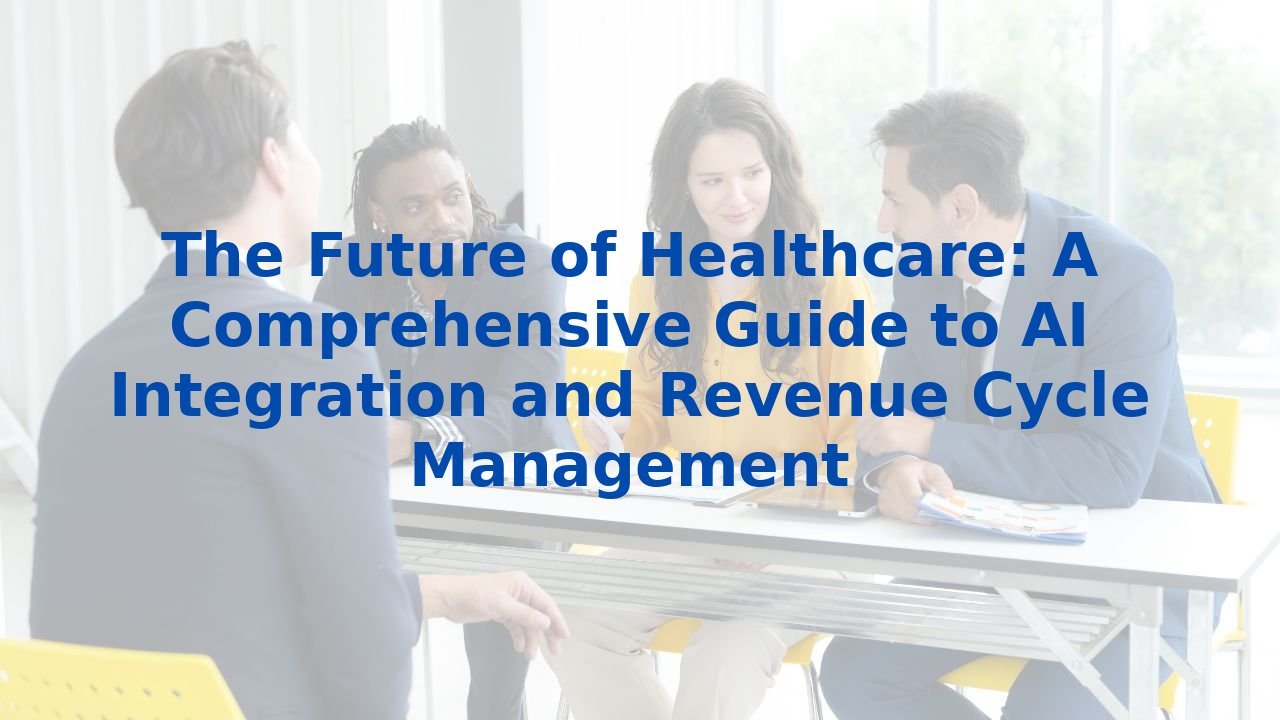The Future of Healthcare: A Comprehensive Guide to AI Integration and Revenue Cycle Management
The Future of Healthcare: A Comprehensive Guide to AI Integration and Revenue Cycle Management
The healthcare industry is on the brink of a transformative era, driven by the power of artificial intelligence (AI). As we look toward the future, the integration of AI within healthcare presents unprecedented opportunities for enhancing revenue cycle management and improving overall operational efficiency. This guide delves into the vital business processes involved and illustrates how AI can elevate these processes to new heights.
Understanding Revenue Cycle Management
Revenue Cycle Management (RCM) encompasses a series of steps organizations undertake to capture, manage, and collect patient service revenue. This intricate process includes everything from initial patient registration to the final payment of the bill. Efficient RCM is crucial for healthcare providers as it directly impacts their financial health and ability to deliver quality care.
The main components of RCM include:
- Patient Registration: Gathering essential patient information to facilitate billing.
- Insurance Verifications: Ensuring that a patient’s insurance coverage is current and applicable to the services provided.
- Charge Capture: Accurately capturing services provided to patients for billing purposes.
- Claims Submission: Submitting claims to insurance providers for reimbursement.
- Payment Posting: Recording payments received and following up on outstanding balances.
The Role of AI in Enhancing RCM
The integration of AI into these RCM processes brings forth several remarkable benefits. By harnessing machine learning algorithms and advanced analytics, healthcare organizations can achieve significant improvements in efficiency and accuracy.
1. Streamlined Patient Registration
AI can simplify the patient registration process by automating data entry and utilizing natural language processing (NLP) to verify patient information quickly. This reduces administrative burdens and minimizes the chances of errors, allowing staff to focus on more meaningful patient interactions.
2. Intelligent Insurance Verification
Through AI-driven systems, healthcare providers can conduct real-time insurance verifications, thereby expediting the entire pre-visit process. By leveraging vast databases, AI algorithms can accurately determine coverage details, ensuring that providers receive timely and accurate reimbursement.
3. Enhanced Charge Capture
AI improves charge capture by automating the identification of billable services and ensuring that nothing is overlooked. By analyzing patterns in treatment data, AI systems can trigger reminders for documentation gaps, thus enhancing accuracy and maximizing revenue potential.
4. Automated Claims Submission and Management
The complexities of claims submission can often lead to processing errors and, consequently, revenue loss. AI can facilitate this process by preparing and submitting claims automatically, while simultaneously monitoring their status in real-time. This ability to optimize the submission process ensures higher approval rates and faster payments.
5. Efficient Payment Posting and Revenue Monitoring
AI-powered tools can streamline payment posting through automation, ensuring all transactions are recorded promptly and accurately. Furthermore, analytics driven by machine learning can offer actionable insights, enabling organizations to predict revenue trends and make data-informed decisions to improve operations.
The Power of Employee Training in AI Adoption
While AI presents transformative potential, the human element cannot be overlooked. Training your workforce is essential to leverage AI effectively. Providing employees with AI training equips them with the necessary skills to understand and utilize the technology, fostering a culture of innovation and adaptability within your organization.
When employees are trained to identify AI opportunities and interpret data-driven insights, they can actively engage in decision-making processes that propel the organization forward. This not only enhances job satisfaction but also drives overall organizational success.
Conclusion
The future of healthcare hinges on the successful integration of AI into revenue cycle management. By embracing AI technologies and prioritizing continuous employee training, healthcare organizations can achieve heightened efficiency, improved financial health, and ultimately, better patient outcomes.
As we navigate this exciting landscape, it is crucial to remain committed to learning and adapting. Whether it’s through expanding your knowledge base on AI or implementing new strategies within your organization, the pursuit of innovation is a journey worth taking. Explore your opportunities to educate your workforce on AI and transform the way you approach healthcare delivery today.
For those interested in exploring AI training programs to equip your entire workforce with essential skills, visit Complete AI Training for more information.



